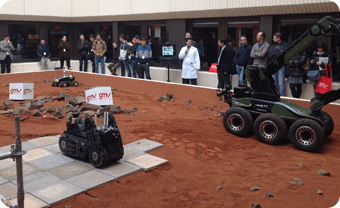5th GMV Robotics Day

GMV has held its 5th GMV Robotics Day (V Jornada GMV de Robótica), showcasing the latest mobile robot research and the many applications of this technology. This event was designed and carried out as part of the European Robotics Week (23-29 November) with over 400 robotics-related events planned throughout the whole of Europe.
In GMV’s head office the 5th Robotics Day brought together the top stakeholders of the robotics world to display their latest breakthroughs, research and applications in a technologically mature sector. The Day kicked off with a presentation of the “Concurrent Design Facility (CDF) for Robotics” competition, in which two groups of university students competed throughout the morning to come up with the best industrial-inspection robotics solution for a make-believe Oil & Gas rig.
This was followed on the day’s agenda by the panel discussion Mobile Robotics Today to debate the current state of mobile robotics and where it is now headed. Participants included Miguel Ángel Sanchís, Coordinator of the Technical Secretariat of the Spanish Technological Robotics Platform (HISPAROB); Fernando Martín Galende, NCP of ICT in Industrial Leadership (H2020 Program) as representative of the Industrial Technology Development Center (Centro para el Desarrollo Tecnológico Industrial: CDTI); Juan Carlos Llorente, Advisor of the CEO and GMV’s Robotics Business Development Officer; Pedro Hernández, Head of the Advanced Computation Project of the REPSOL Technology Center and José Ignacio García, Product Manager of Proytecsa Security.
The panel discussion was followed by exhibitions from the main sector stakeholders, starting with robots of industry and university, then an exhibition of academic developments and ending up with educational robots.
Within the exhibitions of industry robots, as a specific example of mobile robotics applications, GMV explained its participation in the Argos Challenge (Autonomous Robot for Gas & Oil Sites) of the oil and gas firm TOTAL. The idea of this challenge is to foster the development of a new generation of autonomous or remote-controlled surface robots, able to move around on an onshore or offshore site in a potentially explosive environment to reduce personnel’s exposure to high-risk situations and support operators in their maintenance and inspection tasks.
Next up came Proytecsa, a Spanish firm of worldwide prestige and a benchmark in the security sector due to its close collaboration with state security forces and corps of numerous countries. The company performed a demo of the bomb-disposal robot Aunav NEXT/EOD. Designed and developed by this Spanish firm, it is the most advanced bomb-disposal robot on the market. Built with aerospace material, it reduces the potential damage of any explosion and is capable of operating in any type of terrain.
The first exhibition phase ended with Robotplus presenting the collaborative platform MiR100, comprising a grasping device fitted on a mobile base, optimized for logistics tasks involving the transport of small loads. It is a simple, robust and economical ROS-technology robot with many potential fields of application, ranging from hospitals and factories to supermarkets or restaurants.
The second sequence of exhibitions centered on academic developments, with the participation of GMV, URJC, CATEC and CAR UPM-CSIC. GMV presented an example of robotics solutions in 2D microgravity conditions; the Universidad Rey Juan Carlos (URJC) gave a demo of programmed drones; CATEC displayed aerial manipulation using unmanned aerial vehicles and the Robotics and Automation Center (CAR in Spanish initials) of the Universidad Politécnica de Madrid (UPM)-CSIC gave a demonstration of combined speed and position control for remote operation by means of a haptic device and an exhibition of the all-terrain robot Summit XL, which has participated in the euRathlon 2015 competition for post-catastrophe survivor searches.
The series of exhibitions finished with seven experiences of educational robots: a demonstration from the TeknoChisp team, participants in the international robot-building competition for schoolchildren Junior First Lego League (FLL); the Educational Robotics Center Complubot gave a demonstration on how to initiate children aged 10 to 14 in robotics by means of educational guides and activities; Arganbot, the budding engineers school that organizes technology and educational robotics courses for children aged 6 to 16 to familiarize them with this technology; Microlog, which designs, makes and distributes robotics material for schools; SESA, who told the audience about the experience of children touching an educational robot Moway for the first time; Logix5 which presented “My Robot Time”, a robotics kit geared towards the construction of robots remotely controlled by infrared; and lastly the US firm Mathworks, the leading developer of mathematical computing software for engineers and scientists, who exhibited the possibilities of their Matlab programming environment for educational and academic robotics.
The 5th GMV Robotics Day was brought to a close with a presentation of the results of the “Concurrent Design Facility (CDF) for Robotics” competition and the award of the corresponding prizes, followed by an exhibition of the GMV Grand Prix “Sands of Mars”, a speed competition for robots created by independent developers and forming part of the National Robotics League (Liga Nacional de Robótica: LNRC).